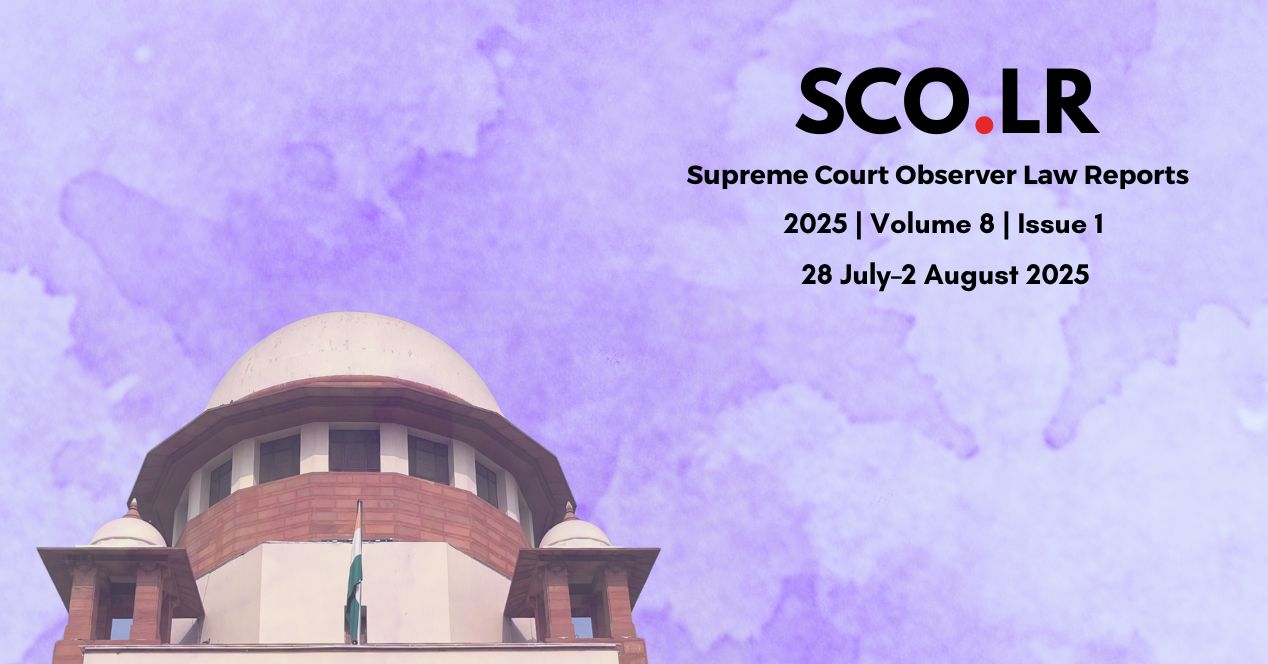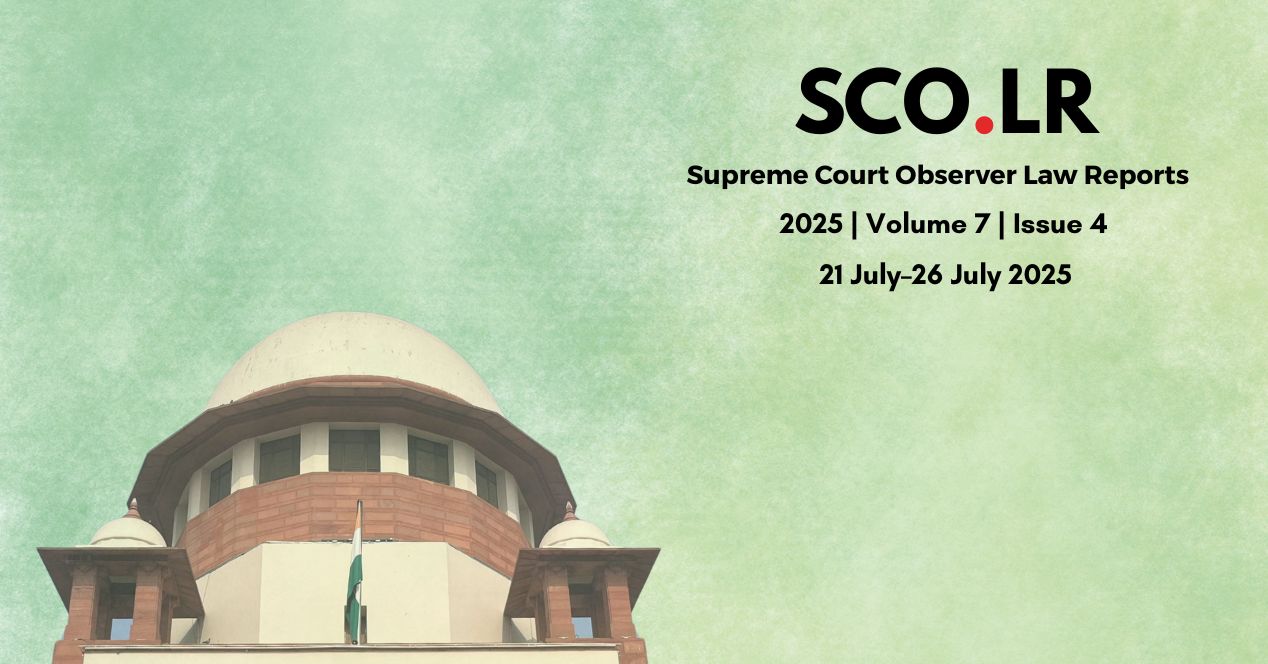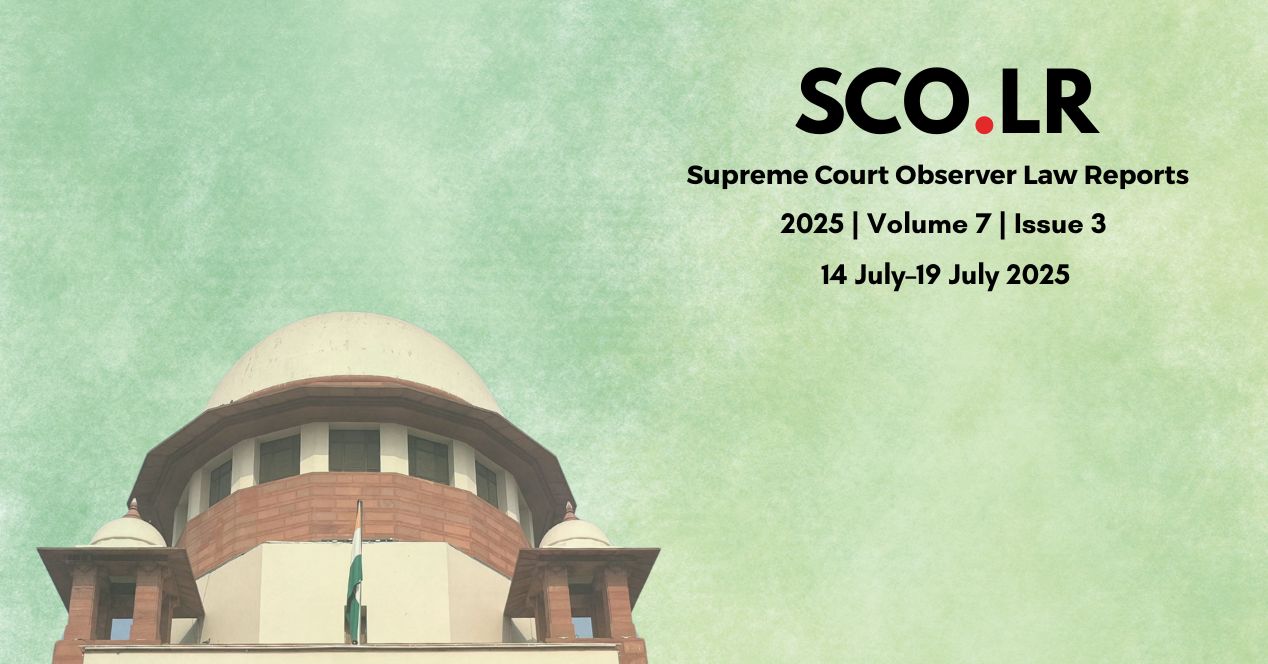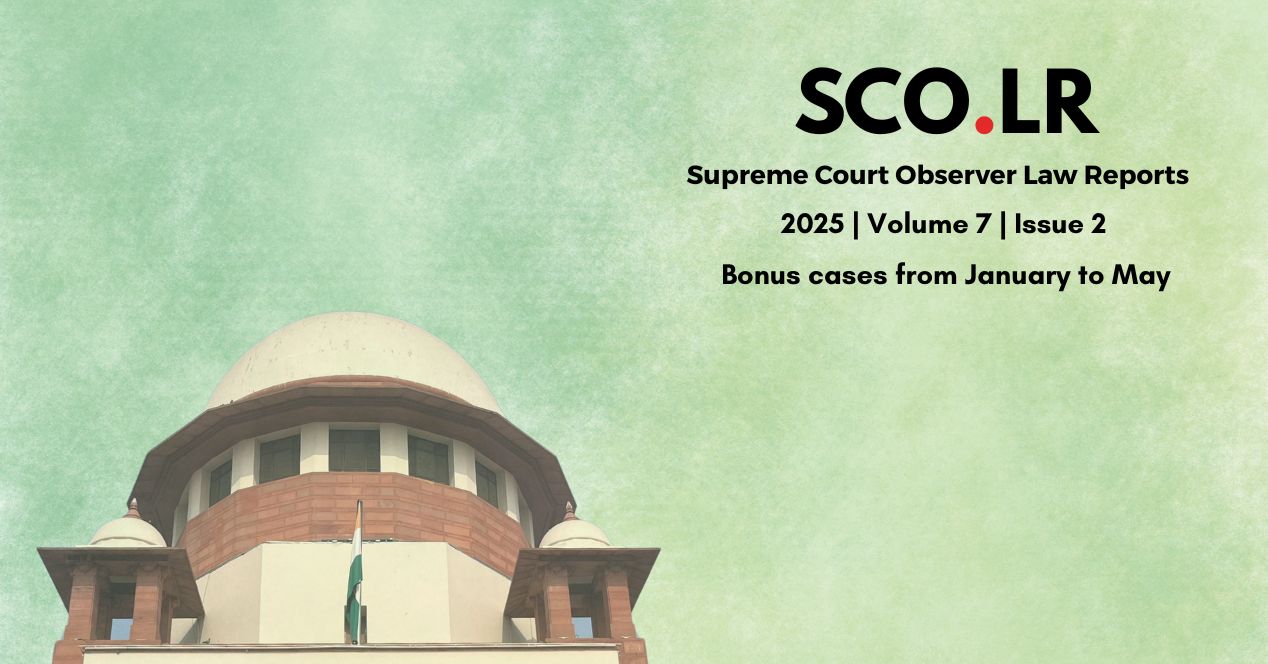Analysis
SCO.LR | 2025 | Volume 8 | Issue 2
In this Issue of SCO.LR, we bring you five important judgements from 4 August to 9 August 2025
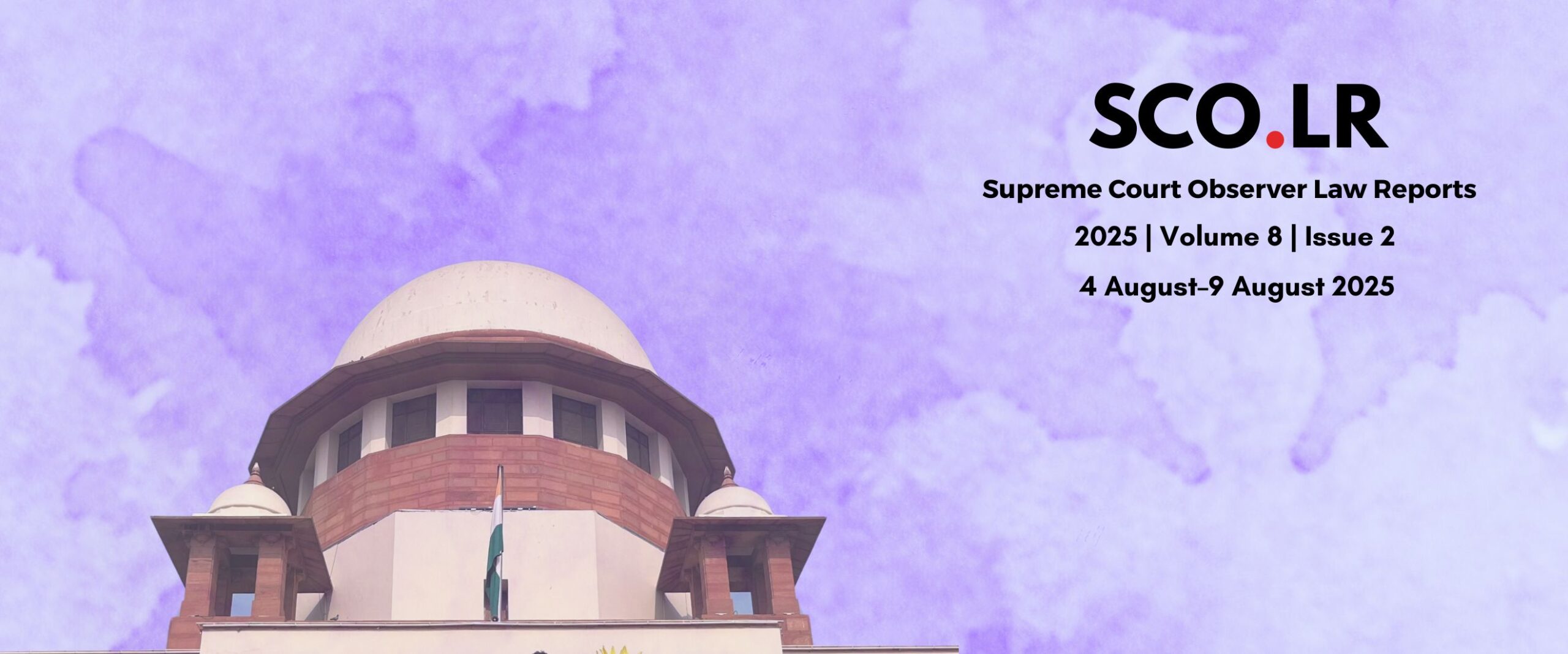
Here’s the latest issue of the Supreme Court Observer Law Reports (SCO.LR)! In Volume 8, Issue 2 of SCO.LR, we look at some of the most notable Judgements from the Court from the second week of August 2025.
These judgements concern conviction in cases where there is only circumstantial evidence, power of pollution control boards, testimony of POCSO victims and many more!
All these judgements are in HTML format on our SCO.LR page. What does this mean? HTML pages allow you to read the judgements in a clean format, with links to footnotes and with the option to hyperlink relevant paragraphs from any judgement in your own research.
Enjoy!
The Supreme Court Observer Law Reports
SCO.LR | Volume 8 | Issue 2
4 August–9 August 2025
**********
Power of Pollution Control Boards to Claim Restitutionary Damages
Delhi Pollution Control Committee v Lodhi Property Co. Ltd.
4 August 2025
Citations: 2025 INSC 923 | 2025 SCO.LR 8(2)[6]
Bench: Justices P.S. Narasimha and Manoj Misra
The Supreme Court held that Pollution Control Boards are empowered to impose and collect restitutionary or compensatory damages, including fixed sums or bank guarantees, as preventive or remedial measures for environmental harm.
The Delhi Pollution Control Committee (DPCC) sent show-cause notices to residential, commercial, and retail complexes operating without mandatory “consent to establish” or “consent to operate” under the Water and Air Acts. A Single Judge in Splendor Landbase Ltd. v DPCC held that State Boards lacked the authority to levy such damages or demand bank guarantees, viewing them as penalties without statutory backing. This view led to refund orders for amounts already collected. The Division Bench upheld these findings, reasoning that Sections 33A and 31A Water and Air Acts conferred no penalty-imposing powers.
The Supreme Court drew a clear distinction between punitive penalties, which require a criminal trial and compensatory environmental damages, which arise from the civil wrong of polluting and seek to restore the environment. The Court relied on the polluter pays principle and affirmed that Boards have wide-ranging post-1988 powers to direct payment for remedial measures. It stressed that these powers must be exercised transparently, non-arbitrarily, and through formalised subordinate legislation.
Keywords/phrases: Pollution Control Boards—Sections 33A and 31A of Water and Air Acts—compensatory environmental damages—Polluter Pays Principle—distinction between penalty and restitutionary measures—environmental restoration—statutory powers of State Boards
Read the Judgement here.
**********
Testimony of Child Victim in POCSO cases
Bhanei Prasad @ Raju V State Of Himachal Pradesh
4 August 2025
Citations: 2025 INSC 934 | 2025 SCO.LR 8(2)[7]
Bench: Justices Aravind Kumar and Sandeep Mehta
The Supreme Court held that a child victim’s testimony requires no corroboration to be considered credible, and Section 29 of the Protection of Children from Sexual Offences Act, 2012 creates a statutory presumption of guilt once foundational facts are established.
The victim’s father was convicted of repeated sexual assault of his daughter. Both the Trial Court and the High Court affirmed his conviction and imposed a life sentence. The father filed a Special Leave Petition before the Supreme Court, challenging the High Court’s judgement and seeking interim bail, claiming false implication due to domestic issues.
The Supreme Court dismissed the petition. The Court stated that its judicial conscience did not permit it to entertain pleas seeking bail where the conviction has been rendered after a full-fledged trial, and where the testimony of the victim is clear, cogent, and duly corroborated. Entertaining such pleas would betray justice and the constitutional promise to children.
Keywords/phrases: Section 29 of the Protection of Children from Sexual Offences Act, 2012—presumption of guilt—testimony of child victim requires no corroboration—victim compensation
Read the Judgement here
**********
Validity of Confessional FIR as Evidence
Narayan Yadav v State of Chhattisgarh
5 August 2025
Citations: 2025 INSC 927 | 2025 SCO.LR 8(2)[8]
Bench: Justices J.B. Pardiwala and R. Mahadevan
The Supreme Court held that a confessional FIR filed by an accused is inadmissible as evidence against them. Further, the Court clarified that expert witness evidence is merely advisory and cannot be the sole basis for a conviction, especially in grave charges like murder.
Narayan Yadav lodged an FIR confessing the murder of Ram Babu Sharma. The Trial Court convicted him of murder under Section 302 of the Indian Penal Code, 1860. The Chhattisgarh High Court partly allowed his appeal, altering the conviction to ‘culpable homicide not amounting to murder under Exception 4 of Section 300’, noting that it was not premeditated and that it was done “in the heat of passion.” Yadav appealed against the decision.
The Supreme Court set aside the High Court’s judgement. It concluded that the confessional FIR was inadmissible and the medical evidence alone was insufficient to secure a conviction and acquitted Yadav.
Keywords/phrases: Section 300 and 302 of the Indian Penal Code, 1860—murder— Confessional First Information Report—Section 8 of the Indian Evidence Act, 1872–culpable homicide under Section 304 of IPC
Read the Judgement here.
**********
Referral Court’s Scope Strictly Limited to Examining Validity of Arbitration Clause
The Managing Director Bihar State Food And Civil Supply Corporation Limited v Sanjay Kumar
5 August 2025
Citations: 2025 INSC 933 | 2025 SCO.LR 8(2)[9]
Bench: Justices P.S. Narasimha and Manoj Misra
The Supreme Court held that a court may refuse to appoint arbitrators as per a contract between two parties involving an arbitration clause only if the dispute impeaches the existence of the arbitration agreement itself, or where it involves public law questions transcending inter-party disputes. .
Bihar State Food and Civil Supplies Corporation alleged that the millers who they supplied paddy for milling had failed to deliver the agreed quantity, causing losses exceeding ₹1000 crores to the public exchequer. Around 1200 FIRs under IPC Sections 420 and 409 were filed and the Enforcement Directorate commenced investigations. Despite ongoing criminal proceedings, the millers invoked the arbitration clause in their agreements. The Patna High Court appointed arbitrators as stipulated under Section 11(6A) of the Arbitration and Conciliation Act, (1996 .
The Supreme Court held that the referral court’s inquiry is strictly confined to determining the existence of an arbitration agreement. Complex issues such as non-arbitrability, allegations of “serious fraud,” limitation, or public law implications fall within the arbitral tribunal’s jurisdiction under Section 16 (competence-competence principle) and are not to be examined at the referral stage.
Keywords/phrases: Section 11(6)—Arbitration and Conciliation Act 1996—competence-competence—serious fraud—non-arbitrability—minimal judicial intervention—public law implications—appointment of arbitrator
Read the Judgement here.
**********
Principles Governing Circumstantial Evidence for Conviction
Shail Kumari v State of Chhattisgarh
6 August 2025
Citations: 2025 INSC 936 | 2025 SCO.LR 8(2)[10]
Bench: Chief Justice B.R. Gavai and Justice K.V. Chandran
The Supreme Court held that a single witness’s testimony should be “wholly reliable” to form the basis of a conviction in cases where only circumstantial evidence is available.
Shail Kumari was accused of the murdering her two children by drowning, with the prosecution’s case hinging primarily on the testimony of sole witness Santosh Kumar Pandey. He claimed that he observed her unusual behaviour near a pond and later found the bodies of the children. Both the Trial Court and the High Court upheld her conviction under Section 302 of the Indian Penal Code, 1860, sentencing her to rigorous imprisonment for life. She filed a Special Leave Petition at the Supreme Court.
The Supreme Court quashed the judgements and acquitted Shail Kumari. The Court found that Pandey’s testimony was not “wholly reliable” and “totally contradictory,” as it showed significant “improvement” from his police statement. Given the case rested on circumstantial evidence and the key witness was unreliable, the prosecution failed to establish a complete and reliable chain of events beyond a reasonable doubt.
Keywords/phrases: Section 302 of Indian Penal Code, 1860—murder—circumstantial evidence—must be beyond reasonable doubt—statement of single witness should be wholly reliable
Read the Judgement here.

